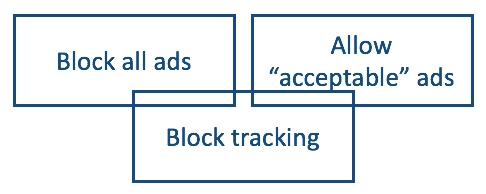By now hundreds of millions of people have gone to the privacy aisles of the pharmacy departments in their local app stores and chosen a brand of sunblock to protect themselves from unwanted exposure to the harmful rays of advertising online.
There are many choices among potions on those shelves, but basically they do one, two or three of these things:

The most popular ad blocker, Adblock Plus, is configurable to do all three, but defaults to allow “acceptable”* ads and not to block tracking.
Tracking protection products, such as Baycloud Bouncer, Ghostery, Privacy Badger and RedMorph, are not ad blockers, but can be mistaken for them. (That’s what happens for me when I’m looking at Wired through Privacy Badger on Firefox.)
It is important to recognize these distinctions, for two reasons:
- Ad blocking, allowing “acceptable” ads, and tracking protection are different things.
- All three of those things answer market demand. They are clear evidence of the marketplace at work.
Meanwhle, nearly all press coverage of what’s going on here defaults to “(name of publisher or website here) vs. ad blockers.”
This misdirects attention away from what is actually going on: people making choices in the open market to protect themselves from intrusions they do not want.
Ad blocking and tracking protection are effects, not causes. Blame for them should not go to the people protecting themselves, or to those providing them with means for protection, but to the sources and agents of harm. Those are:
- Companies producing ads (aka brands)
- Companies distributing the ads
- Companies publishing the ads
- All producers of unwanted tracking
That’s it.
Until we shift discussion to the simple causes and effects of supply and demand, with full respect for individual human beings and the legitimate choices they make in the open marketplace, to protect the sovereign personal spaces in their lives online, we’ll be stuck in war and sports coverage that misses the simple facts underlying the whole damn thing.
Until we get straight what’s going on here, we won’t be able to save those who pay for and benefit from advertising online.
Which I am convinced we can do. I’ve written plenty about that already here.
* These are controversial. I don’t go into that here, however, because I want to shift attention from spin to facts.
Save
Save
Save
Save
Save
Save
Save

consumers looking for a stress-free session online, the arrival of ad-blocking software has been a godsend. However, the technology isn’t getting everyone’s praises.
While there’s a lot of irrelevant advertising content found on the web, for leading marketers trying to sell their brand to potential customers, the ad-blocking tool has become more of a hazard — and a danger to vital income and sales.
It’s like an ‘omni-block’ where even the good content that is relevant to them is being excluded, and they are prepared and willing to go ahead with that direction, because the rest of it is so extraordinarily irrelevant to them and the span of attention for consumers today is so less, that they don’t want to waste their time on something that’s not relevant.